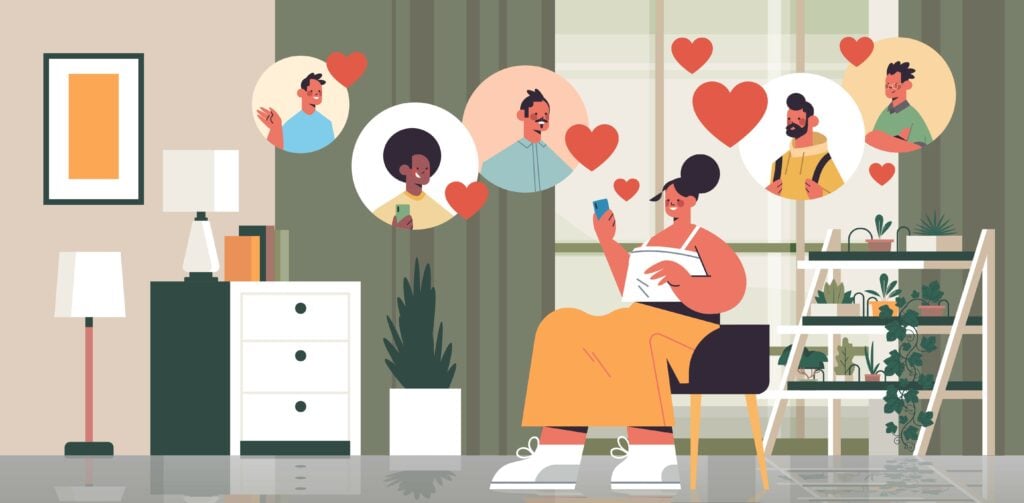“I’m not that guy”: Navigating the new couples conversation
Written by David Wexler, PhD


Relationships have always been unendingly complex: a tricky dance of intersecting personalities, attachment issues, and personal histories. But in recent years, political and cultural realities have permeated relationship bonds in new ways, affecting the way partners read each other’s comments and actions, and at times severely undermining trust.


In my practice, the politics of gender has become paramount in a way that we haven’t seen since the ’70s. Some clients have even told me it’s become the linchpin for whether or not the relationship can be saved.
Miles and Michelle are Korean American professionals in their early 30s who’d been married for three years when they started seeing me. Though they were politically aligned, our culture’s renewed focus on sexually abusive behavior was a trigger for heated arguments and blistering resentments that were tearing their marriage apart.
We were a few weeks into therapy when talk of comeuppance for infamous #MeToo characters like Bill Cosby and Harvey Weinstein was big news. Miles and Michelle were in agreement: Any punishment the men faced should be severe.
But not every #MeToo case was straightforward for Miles. When our talk turned to comedian Louis C.K.’s attempting a comeback in New York clubs after admitting to masturbating in front of women he worked with, Miles and Michelle’s alignment disintegrated.
Miles turned to me and said, “I know that what he did was messed up, but, wow, not as horrible as Michael Jackson or R. Kelly. They went after children. That’s the worst!”
Michelle shot back, “So you think that if some guy masturbated in front of me, that’d be okay?” Shaking her head and sliding farther away from Miles on the couch, she turned to me and said, “I can’t feel safe with someone who thinks like that.”
Old roles die hard
Miles had grown up with some old-school ideas about gender roles, but he was politically progressive and very verbal in session. On their initial visit to my office, I’d noticed that though he watched Michelle carefully as we worked, she averted her eyes.
When I asked my standard opening question—“So, what are the two of you doing here?”—it was Miles who dove in first.
“I was really controlling when we first got married. We’ve come a long way since then.”
He turned to Michelle with a beseeching smile, “Right, honey?”
Michelle, who’d ensured that there was space between them on the couch, didn’t look at him. To me, she said, “He thinks we’re over it more than I do.”
Miles smiled weakly. “Michelle still has leftover feelings about how I treated her that I think we need to straighten out,” he said.
When I took their family histories, both were critical of the treatment they’d received at the hands of their domineering and sometimes physically abusive fathers.
Miles said, “My dad would slap me across the head if I didn’t answer his questions right, and he expected my mom to take care of him and do what he asked her to do. I know that I kind of fell into some of those patterns early on with Michelle—but I’d never dream of hitting her.”
Still, like many men of his generation, he perpetuated in his own home plenty of the old-school gender role expectations that he’d grown up with. And as he spoke about his respect for women’s rights, I noticed that Michelle was staring at the wall.
“Michelle,” I said. “How is what you’re hearing right now feeling to you?”
She leaned a bit forward and said, “I know he’s trying, and he’s changed a lot, but, like a lot of men, he doesn’t see the ways he’s sexist. And it’s getting to the point that sometimes his sexism is all I can see.”
Miles’s jaw tightened, and he looked down at the rug as she continued.
“He needs me to pay attention to him above all else. It doesn’t matter if I’m trying to work or get a break for myself: I have to stop what I’m doing and listen every time he has something to say.
“He’s also constantly pressuring me for sex, and if I tell him I’m tired or I can’t do it in the moment, he’ll get angry and stay that way for days. I’d been giving in to him to avoid the fallout, but lately I’ve been asking myself, why should I? Why does sex have to happen when he wants it? I mean, is sex a right? What about my right to have it only when I want to?”
I could see Miles leaning farther forward, readying to respond, but I kept the focus on Michelle. She continued, this time explaining that Miles rarely helped around the house. How, she wanted to know, was that egalitarian behavior?
“You know, I grew up in a family with these kind of patriarchal values, just like he did, so it seemed normal at first to do the cooking and cleaning. Some of my friends still do the same thing, but more and more of them don’t. Their husbands are genuinely enlightened; they don’t just pretend to be. And I’ve been asking myself, why should I do so much more around the house? And why does he think I should?”
I turned to Miles, who, to his credit, had leaned back in his chair and was focused on listening to Michelle.
“Miles,” I said. “You’ve heard Michelle’s distress, the pressure she feels, the inequality she sees. What do you think?”
Miles looked from me to Michelle, and quite sweetly began to express genuine remorse for pressuring her and blindly expecting her to behave like a ’50s housewife.
We ended that first session on a productive high note by brainstorming ways Miles could implement new behaviors, and Michelle could feel freer to express her limits.
When we next met, they were sitting a little closer. Michelle reported Miles was doing the dishes most nights and laundry on the weekends, and had begun dropping his demands for sex. I was struck by how quickly these changes had taken hold and how genuinely open Miles seemed. Things appeared to be going so smoothly that I congratulated them both.
What I failed to see was that as Michelle was finding a stronger voice in her marriage, she’d come to believe that Miles could be capable of empathizing with her experience of being a woman in the world. But the reality was that he still had quite a way to go.
A broken mirror
A few weeks later, when Miles found himself defending Louis C.K. in our session, and drawing that line where he thought the #MeToo movement should stop and the defense of supposedly lesser offenders should begin, all Michelle could hear was that his sexist attitudes hadn’t been extinguished. The possibility that he might minimize the assaults that she’d endured in her own life, that maybe she couldn’t feel safe with him, hit her hard.
At first, Miles was defensive. “Why are you trying to control my opinions?” he asked, dropping his head into his hands. “You’re not listening to what I’m saying. I didn’t do anything to you!”
Perhaps, in a court of law, Miles’s argument would be worth pondering. There’s a continuum of sexual offenses, just like there’s a continuum of offenses from petty theft to armed robbery. But intimate partner relationships are governed by more nuanced rules than courts of law.
I heard in Miles’s emotional, defensive response a phenomenon I call the Broken Mirror. Based on the concept of a mirroring self, it describes the defensive reaction we’re capable of when another person leads us to feel incompetent, offensive, or insignificant.
When the Broken Mirror is activated, there’s almost always a breakdown in what’s called “empathic accuracy.” All Miles could hear was Michelle accusing him of being sexist again and of falling short of being the trustworthy man she needed. Miles experienced this as a threat, so he went into survival mode and was blocked from accurately empathizing with her pain.
I saw this as the most important element of the blowup, and I zeroed in on helping Miles get past his perceived injury and move on to Michelle’s unspoken attachment and emotional security issues instead.
“Miles, what do you think Michelle was feeling when she said she can’t feel safe with you?”
Miles thought about it: “She was feeling critical of me, like there’s something wrong with me, and she was judging me.”
I gently shook my head and told him that this wasn’t a feeling. He took a breath, looked up at the ceiling. and gave it some more thought. “Maybe scared? Like she couldn’t trust me?”
Bingo.
“I know you love her and want to do right by her,” I said. “So how would you respond if she turned to you and said she doesn’t feel safe, and worries she can’t really count on you?”
He didn’t hesitate. “I’d want to comfort her, to reassure her that she could.”
“Good! Let’s do it. Turn to her and ask how this made her feel.”
He took a deep breath and with tender sincerity said, “I don’t think I can really know what this is like for you, but I want to. It kills me that things I’ve done or said have made you feel unsafe. I never want that to happen again.”
That’s when the specter of Michelle’s dissertation chair, who once trapped her in his office and insisted on oral sex, entered the therapy room. With some stops and starts, and coaching from me, Michelle told Miles the whole story of her encounter with the professor.
“He locked the door to his office when we met. And he’d get this creepy look, like he thought he was God’s gift to women and I should jump at the chance to be with him. He unzipped his fly and pointed at his crotch. It happened a couple of times. I didn’t know what to do, so to get out of it I giggled and talked about my fake boyfriend and my Catholic upbringing.
“I had to keep dealing with him, and I didn’t sleep for months. I blamed myself for somehow seducing him. I was terrified he’d sabotage my dissertation. I even thought about killing myself.
“And I had no one to turn to. My brother wouldn’t understand, and would probably try to kill him. I didn’t want to freak my parents out. I was ashamed. I worried if I told any of my friends at school, the story could leak out, and he’d find out and retaliate. I’d never felt so alone. I never want to feel that alone again.”
Empathic accuracy
Tears filled Miles’s eyes, and as they sat in silence, I could see it sinking in that Michelle’s earlier reaction was bound up in a history much bigger than him. He’d never heard this story in detail before. It was a history she’d shared with many other women, and in retelling it in the therapy space, she helped him transcend his hurt and be compassionate instead.
He reached out and put a hand on her forearm.
“I never understood how much you went through with your professor. All I could see was you attacking me. Now I wish you’d told me about this earlier. I’m not sure I’d have truly gotten it, but maybe. But I do get it now. And I’m so sorry I’ve made you feel even worse about something that has been so hard for you.”
Michelle went on to explain how much of a trigger his initial comments were, as if he was minimizing sexual harassment and pressure. She welled up, and he scooted closer to her on the couch. Encircling his wrist with her fingers, she gave him a soft smile.
She spoke up, and we woke up
Over the last few years, men’s empathic accuracy has repeatedly been disabled because they feel misunderstood or attacked. I’m finding that restoring empathic accuracy hinges on placing the totality of a partner’s experiences with men in the context of a continuum of #MeToo traumas. When that shift happens, it’s much easier for men not to take comments personally, and to respond to women’s core feelings with appropriate love and respect.
It occurred to me, as this moment of healing filled the room, that it was essential for Michelle to speak up in a way that included her husband, rather than attacking him. He wasn’t the ogre that some of these other men were. He was trying. Could she see that?
I even told Michelle that what Miles had said about the continuum of offensiveness in #MeToo behaviors had some validity. “Michelle,” I said. “I want to encourage you to try to recognize this truth, so Miles doesn’t remain for you in the same category as your college professor—or Louis C.K., for that matter.”
For a long moment of deep silence, the air seemed to leave the room.
Then Michelle, who’d been leaning into the shared space between us, recoiled from me, pushed back into the couch, and stared at the ceiling for a hard moment before raising her voice.
“Neither of you get it! You don’t know what it’s like!”
She accused me of trying to minimize both what Miles had said and the legitimacy of her mistrust. She was right, and I knew it immediately. I’d become just one more guy who didn’t take these experiences seriously enough.
A quote from the actress Minnie Driver about the supposed relativity of #MeToo offenses bloomed in my mind. She’d said, “I realized that for most men, good men, men I love, there’s a cutoff in their ability to understand. It’s all fucking wrong, and it’s all bad, and until you start seeing it under one umbrella, it’s not your job to compartmentalize or judge what’s worse and what’s not.”
Michelle’s response woke me up, and I launched myself back into the crucial task of helping Miles appreciate her anxiety and insecurity. This needed to remain paramount if their relationship was going to heal—not his feelings of being the “misunderstood male.”
Miles reassured Michelle that he’d never tolerate any man treating her badly, and then said, “If Louis C.K. ever masturbated in front of you, I’d kick his ass.”
Michelle looked at him for a full beat and laughed. “I actually believe you would.”
As we continued our work, some of Miles’s narcissistic issues and some of Michelle’s quiet suffering and resentment persisted. Their breakthrough didn’t lead to immediate and miraculous changes—but it helped. The conflicts lessoned. They could see a new path had opened for them.
The issues raised by the #MeToo movement enabled Michelle to pay more attention to how her history has affected her. She was inspired to put words to these feelings with her husband in ways that she never could before. And despite his initial defensiveness and self-preoccupation, he got it. She spoke up, and Miles woke up.
My own path with these societal issues in the clinical space has also become more visible. To follow it, I must encourage the woman to speak up and the man to expand his awareness and become her ally. But also, I must focus on stabilizing their emotional states, not qualifying who’s right or wrong, and I must always remember how many ghosts and global issues have joined me in the therapy room.
David Wexler, PhD, is a clinical psychologist, executive director of the Relationship Training Institute in San Diego, California, and coauthor of the book “#MeToo-Informed Therapy: Counseling Approaches for Men, Women, and Couples.” He’s also the author of “When Good Men Behave Badly,” “The STOP Domestic Violence Program,” and “Men in Therapy.”

About the publisher
For nearly 50 years, the Psychotherapy Networker magazine has been celebrated for its incisive and heartfelt articles on the challenges of clinical practice, the therapeutic innovations shaping the field, and the extraordinary experience of being a therapist.
Related articles

Can couples apps help you reconnect?
If you’re looking to keep (or bring back) the spark in your relationship, it...

To stay together forever, get a sleep divorce
One in five couples sleep in separate rooms. So why do we still feel so weird...

Second adolescence: An alternative to the midlife crisis
Instead of viewing midlife as a time of emotional unraveling, therapists can...

The psychological effects of dating apps
Dating apps can help you find your person, but they can also be hard on your...
